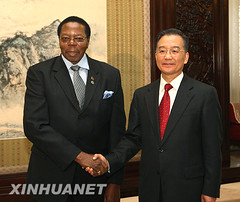
Malawian President Bingu wa Mutharika and People's Republic of China Premier Wen Jiabao in Ziguangge, Zhongnanhai in 2008. Mutharika was recently re-elected to his post in the southern African nation and is currently the Chair of the African Union.
Originally uploaded by Pan-African News Wire File Photos
China Puts Best Face Forward With News Channel
By DAVID BARBOZA
New York Times
SHANGHAI — The Xinhua News Agency, China’s dominant news service and the propaganda arm of the Communist Party, introduced a 24-hour English-language news channel and is preparing to open a prominent newsroom in Times Square, part of an expensive push to increase the reach and influence of the Chinese news media overseas.
The president of Xinhua, Li Congjun, said Thursday at a press conference in Beijing that CNC World, the agency’s new 24-hour news channel, was part of a government effort to “present an international vision with a Chinese perspective.”
The announcement is the strongest sign yet that China intends to spend billions of dollars over the next few years to create a global media empire that can match the country’s rising economic and diplomatic power and more effectively project its views to an international audience.
Beijing officials have long complained that China is often portrayed unfavorably in the Western media and that what it considers biased news coverage has hurt the country’s interests abroad.
The new channel, which media experts say appears to be modeled on Al Jazeera, the Arabic news network, aims to provide comprehensive coverage of world affairs, while explaining matters of direct concern to the Chinese leadership in a perspective its producers consider appropriate.
Analysts say China’s global media expansion is striking because many Western media giants, faced with an advertising slump, have scaled back operations by closing bureaus and laying off employees.
“While our media empires are melting away like the Himalayan glaciers, China’s are expanding,” said Orville Schell, director of the Center on U.S.-China Relations at the Asia Society in New York and a former dean of the journalism school at the University of California, Berkeley. “They want to get every hallmark of the world of credible journalism they can, and being in New York City, in an iconic location, is part of that.”
On Thursday, an official with Xinhua, who spoke on condition of anonymity because he was not authorized to talk to the press, said Xinhua was planning to build a newsroom at the top of a 44-story skyscraper in Times Square, giving it an address in the same neighborhood as Reuters, Conde Nast, News Corp and The New York Times.
Xinhua’s move is just one of several planned by Beijing. China Central Television, the country’s biggest state-run television broadcaster, has also been expanding overseas and offering broadcasts in English, Spanish, French, Arabic and other languages. And China has heavily financed a makeover of China Daily, its English-language daily newspaper, and introduced a new English edition of Global Times, which is controlled by People’s Daily, the leading Communist Party-run newspaper.
Whether state-run news services financed and controlled by Beijing can attract a big international audience or earn significant revenues overseas remains uncertain. Many media experts say Chinese news agencies, though improving, lack credible and objective reporting and are widely perceived to be propaganda vehicles for the Chinese government.
“We’ve criticized them a lot because they’re a propaganda tool,” said Clothilde Le Coz, the Washington director of Reporters Without Borders. “So the fact that they want to expand in the U.S., we’d like to see what that would look like.”
There have also been reports over the years that some of China’s state-run news agencies are closely tied to state intelligence agencies. Xinhua got its start in 1931 as the Red China News Agency, even before the Communist Party gained power in 1949.
Xinhua still functions as China’s official news bureau, releasing government reports and official statements for Politburo members, and setting the tone for China’s other heavily censored news publications, which are often instructed to republish Xinhua dispatches on major news events without alteration.
On Thursday, the agency said in announcing its new 24-hour English news channel that it hoped to offer a “better view of China to its international viewers.” And it will try to do that, it said, with English-language news, live Internet broadcasts, talk shows and in-depth reporting.
The agency already has more than 10,000 employees and 120 bureaus around the world, rivaling the reach, if not the quality, of Western news services like Reuters or Bloomberg. Xinhua has begun recruiting non-Chinese journalists from around the world to write for its news services.
Mr. Schell at the Asia Society says Beijing is serious about trying to present its news agencies as a credible alternative to global brands.
“Despite Herculean efforts, they don’t think they’re taken seriously; the agency is not on equal footing on credibility,” he said of Xinhua. “But we’re one step away from the next stage, when they pick up distressed properties in the global media world.”
Christine Haughney contributed reporting from New York.
No comments:
Post a Comment